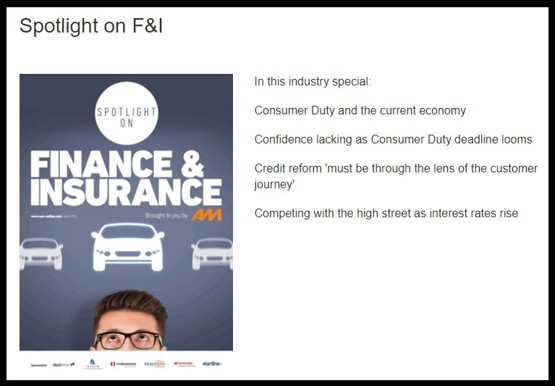Letting customers self-serve their motor finance needs is proving the most effective route to Consumer Duty compliance, iVendi is reporting.
Finance providers have until the end of this month before the new Financial Conduct Authority (FCA ) regulations start.
Consumer Duty is aimed at creating higher standards for consumers and improving competition in the retail financial services market.
Rob Severs, senior VP products and insight at the connected motor retail technology company, said experience was showing that a watertight self-serve process offered the best real-world route to ensuring the FCA's requirements were being met.
Severs said: “When the FCA first unveiled Consumer Duty, we looked at ways to achieve compliance using our technology.
“It quickly became clear that having a self-serve journey for customers would probably be the most suitable solution – and that is proving correct now that we are seeing dealers adopt these measures in practice.”
Severs said self-serve allows dealers to define a carefully structured digital journey that is compliant and contains no obvious weaknesses.
 The alternative, he explained, was to allow a degree of human intervention in the process, introducing a wide range of variables that could result in non-compliance.
The alternative, he explained, was to allow a degree of human intervention in the process, introducing a wide range of variables that could result in non-compliance.
He said: “For the biggest dealers, who have dedicated F&I staff, that approach might be a possibility but even then you’re asking people to have knowledge of perhaps hundreds or even thousands of motor finance product combinations.
“How can you expect that person to fulfil FCA Article 12 and choose the best outcome for an individual?
“Self-serve means you can demonstrably meet the requirements of the FCA’s four outcome areas and three cross cutting rules, minimising the chances of mis-selling, while creating a clear digital trail that can show compliance if you are challenged.”
Reducing daily Consumer Duty admin
A further advantage for dealers, Severs added, was the amount of work that Consumer Duty created for dealers on a day-to-day basis was reduced to a minimum.
He said a human-based process creates a huge amount of information to record for every motor finance deal made and this would have to be done manually, noting every step of the process. Self-serve removes this need.
Severs said: “In fact, based on what we are seeing in the market, the real question is not to ask why dealers should self-serve but what they are using as an alternative?
“We see very few instances where other methods look set to produce the same level of compliance.
“Research from Deloitte’s 2022 Global Auto Consumer Survey EMEA suggests that only a maximum of 5% of UK car buyers carry out their motor retail journey entirely online, so what are dealers providing in the other 95% of instances and how are they ensuring that Consumer Duty is being met?”
Self-serve isn’t limited to online-only use, he explained, and with the right technology in place the same journeys can be offered in the showroom, ensuring all customers have gone through an identical process and that retailers have the same level of information recorded for every motor finance deal they make.
He said: “If a customer is in your showroom, you can hand them an iPad, give them a cup of coffee and sit them in a comfortable seat to self-serve their finance journey.
"Your staff will be on hand to help with any questions they may have but you are also available to speak to other customers, maximising time and efficiency.”




















Login to comment
Comments
No comments have been made yet.